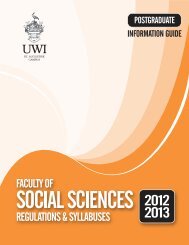Faculty of Humanities and Education (Postgraduate) - The University ...
Faculty of Humanities and Education (Postgraduate) - The University ...
Faculty of Humanities and Education (Postgraduate) - The University ...
Create successful ePaper yourself
Turn your PDF publications into a flip-book with our unique Google optimized e-Paper software.
124<br />
POSTGRADUATE REGULATIONS & SYLLABUSES 2012 - 2013<br />
THE FACULTY OF HUMANITIES & EDUCATION<br />
REFERENCES<br />
Bennett, N., Crawford, M., & Riches, C. (Eds.). (1992). Managing<br />
change in education: Individual <strong>and</strong> organizational<br />
perspectives. London: Paul Chapman.<br />
Morphet, E. L., Johns, R. L., & Reller, T. L (Eds.). (1982). <strong>Education</strong>al<br />
organization <strong>and</strong> administration: Concepts, practices, <strong>and</strong><br />
issues (4 th ed.). Englewood Cliffs, NJ: Prentice-Hall.<br />
Owens, R. G. (1998). Organizational behaviour in education (6 th<br />
ed.). Boston, MA: Allyn & Bacon.<br />
Sisson, K., & Storey, J. (2000). <strong>The</strong> realities <strong>of</strong> human resource<br />
management: Managing the employment relationship.<br />
Philadelphia, PA: Open <strong>University</strong> Press.<br />
Ubben, G. C., Hughes, L. W., & Norris, C. J. (2001). <strong>The</strong> principal:<br />
Creative leadership for effective schools (4th ed.). Boston, MA:<br />
Allyn & Bacon.<br />
YEAR:<br />
SEMESTER:<br />
COURSE CODE: EDME 6121<br />
COURSE TITLE: EVALUATION OF EDUCATIONAL SYSTEMS<br />
NUMBER OF CREDITS: 4<br />
COURSE DESCRIPTION:<br />
Overview<br />
This course is intended to (a) assist the evaluators in defining<br />
what their responsibilities should be when pursuing activities<br />
in the context <strong>of</strong> programmes, products, <strong>and</strong> curricular<br />
evaluation; (b) provide an evaluation framework, which should<br />
allow evaluators to choose an appropriate model or strategy to<br />
guide their evaluation; <strong>and</strong> (c) make available to the evaluator<br />
the method <strong>and</strong> techniques for dealing with the collection <strong>and</strong><br />
analysis <strong>of</strong> evaluation data.<br />
OBJECTIVES<br />
Students will:<br />
1. underst<strong>and</strong> the scope <strong>of</strong> their involvement in the evaluation<br />
<strong>of</strong> courses, programmes, <strong>and</strong> curricula at the school;<br />
2. discriminate between st<strong>and</strong>ards used to judge or evaluate<br />
performance in different programmes or contexts;<br />
3. design <strong>and</strong> use appropriate models, strategies, or<br />
frameworks to conduct evaluation exercises;<br />
4. select outcome measures in evaluating teachers,<br />
administrators, students, <strong>and</strong> departments <strong>and</strong> projects at<br />
the school;<br />
5. identify relevant approaches <strong>and</strong> strategies in data<br />
collection <strong>and</strong> data analysis.<br />
CONTENT<br />
• Perspectives:role <strong>and</strong> context <strong>of</strong> evaluation,evaluation as a<br />
disciplined inquiry, st<strong>and</strong>ards for evaluation <strong>of</strong> programmes,<br />
products, <strong>and</strong> curricula<br />
• Focus on evaluation within an educational system: systemwide<br />
evaluation, national monitoring <strong>of</strong> existing curricular<br />
programmes, teacher evaluation <strong>and</strong> accountability, school<br />
evaluation administration, curricular programme, plant,<br />
equipment <strong>and</strong> materials; evaluation <strong>of</strong> performance units<br />
• Evaluation <strong>of</strong> curriculum development projects from the<br />
identification <strong>of</strong> values <strong>and</strong> derivation <strong>of</strong> aims to largescale<br />
implementation<br />
• Design evaluation models <strong>and</strong> strategies: Selection <strong>of</strong><br />
outcome measures, judgmental, decision-management<br />
<strong>and</strong> decision-objective strategies, st<strong>and</strong>ard group designs,<br />
individualised programme designs, multi-stage, holistic,<br />
<strong>and</strong> quality assurance models<br />
Methods <strong>of</strong> Delivery<br />
<strong>The</strong> course will be delivered by a team <strong>of</strong> lecturers in a<br />
combination <strong>of</strong> plenary <strong>and</strong> small-group sessions. In addition,<br />
students will make presentations analyzing data from individual<br />
schools, educational districts, <strong>and</strong> national systems.<br />
ASSESSMENT<br />
Examination 60%<br />
Coursework assignment 40%<br />
REFERENCES<br />
Bell, C., & Harris, D. (Eds.). (1990). Assessment <strong>and</strong> evaluation. New<br />
York: Kogan Page.<br />
Br<strong>and</strong>t, R. S. (1981). Applied strategies for curriculum evaluation.<br />
Alex<strong>and</strong>ria, VA; Association for Supervision <strong>and</strong> Curriculum<br />
Development.<br />
David, J. (1989). Synthesis <strong>of</strong> research on school-based<br />
management. <strong>Education</strong>al Leadership, 46(8), 45–53.<br />
Donmoyer, R. (1995). <strong>The</strong> rhetoric <strong>and</strong> reality <strong>of</strong> systemic reform:<br />
A critique <strong>of</strong> the proposed National Science <strong>Education</strong><br />
St<strong>and</strong>ards. <strong>The</strong>ory into Practice, 34(1), 30-34.<br />
Hoy, W., & Miskel, C. (2005). <strong>Education</strong>al administration: <strong>The</strong>ory,<br />
research <strong>and</strong> practice (7 th ed.). New York: McGraw-Hill.<br />
National Research Council. (1996). National Science <strong>Education</strong><br />
St<strong>and</strong>ards. Washington, DC: National Academy Press.<br />
Owen, J. M., & Rogers, P. J. (1999) Program evaluation: Forms <strong>and</strong><br />
approaches. London: Sage.<br />
Popham, J. (1987). <strong>The</strong> merits <strong>of</strong> measurement-driven instruction.<br />
Phi Delta Kappan, 68(9), 679-682.<br />
Smith, M., & O’Day, J. (1991). Systemic school reform. In S.<br />
Furhman & B. Malen (Eds.), <strong>The</strong> politics <strong>of</strong> curriculum <strong>and</strong><br />
testing: <strong>The</strong> 1990 yearbook <strong>of</strong> the politics <strong>of</strong> education (pp.<br />
233-267). Philadelphia, PA: Falmer Press.<br />
Walberg, H., & Haertel, G. (Eds.). (1990). <strong>The</strong> international<br />
encyclopaedia <strong>of</strong> educational evaluation. Oxford, UK:<br />
Pergamon Press.

















